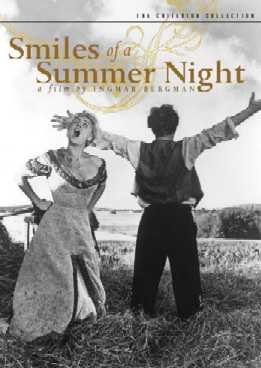|
Reviews of Recent Independent, Foreign, & Documentary Films in Theaters and DVD/Home Video
SMILES OF A SUMMER NIGHT
Ingmar Bergman wrote and directed Smiles of a Summer Night just before he delivered
his brooding masterpiece The Seventh Seal. The contrast is remarkable: only two years
before Max von Sydow's knight played out his futile endgame with Death, Bergman had his
ensemble cavorting about the grounds of a country house in the perpetual light of a Swedish
summer evening. Yet the two films are not entirely dissimilar. Just as The Seventh Seal
was leavened by doses of graveyard humor, so the comedy of Smiles is shot through with
melancholy reflections on love's brevity. Revealing the diverse and ambiguous emotions of his
characters, his work is far richer than his reputation for gloominess suggests. This 1955 film provides a
shimmering counterpoint to its successors. Bergman's sharp comic dialogue is a delight, but
terrific acting anchors the film: Gunnar Björnstrand, noted for later performances playing figures
with more existential dilemmas, delivers a nuanced portrait of the frustrated, dandyish Fredrik
Egerman. He, his young wife, and his prudish son from a former marriage are invited to a country
house by Desiree (Dahlbeck) - Egerman's former lover - and her mother (played magnificently by
septuagenarian Naima Wifstrand). The singer's present lover and his wife are also guests. The
resulting friction among these characters and the burgeoning romance between servants, played
vibrantly by Harriet Andersson and Åke Fridell, propel the story to startling conclusions.
Gunnar Fischer's photography captures perfectly the dazzling light of an endless summer day, as
it glimmers through trees, glistens off water, and bursts over fields. And Bergman deftly uses the
constraints of place and time to focus on the absurdities and sorrows of people falling in and out
of love. Every scene, from an evening at the theater to a game of Russian
roulette, elicits new insight into the characters. The film is stately and unhurried, yet every shot
feels essential, and the comic momentum never abates. Extras: The extras for this film
make the DVD package seem slight, particularly for a Criterion release. The introduction
featuring Bergman is tantalizingly short. While the director is relaxed and forthcoming, the
interview itself isn't particularly informative. (It's essentially a tease, conducted in a
screening room as if Bergman is about to watch the film and comment.) The original Swedish
trailer is an entertaining trifle. The conversation between film historian Peter Cowie and writer
(and Fanny and Alexander executive producer) Jörn Donner provides insight into how
Smiles fits into Bergman's career, and gives interesting facts about the actors.
But it makes you wonder why Criterion didn't have them simply provide an audio commentary,
especially since the most interesting parts of this conversation happen while it plays over scenes
from the film. Extras are somewhat beside the point here. The film is essential for any admirer of
Bergman and proves that comedy can be as significant as drama, though it is regrettable that it hasn't
been accorded the DVD deluxe treatment. Arthur Vaughan
|
